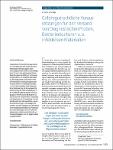Gefahrgutrechtliche Voraussetzungen für den Versand von Diagnostischen Proben, Bakterienkulturen u. a. infektiösen Materialien
Thurm, V.
Tschäpe, Helmut
Diagnostische Proben (Blut, Organmaterial u.ä.) von Menschen oder Tieren, die Krankheitserreger enthalten, gelten als ansteckungsgefährliche Stoffe und unterliegen beim Transport den gefahrgutrechtlichen Bestimmungen. Das trifft auch auf isolierte Erregerkulturen u.a. infektiöse Materialien zu, die häufig gerade durch medizinische Einrichtungen zu Untersuchungszwecken versandt werden. Der jeweilige Absender, z. B. Arzt oder Laborleiter, trägt dabei eine hohe Verantwortung für die sachgerechte Klassifizierung des Untersuchungsgutes in die zutreffende gefahrgutrechtliche Risikogruppe (in Anlehnung an die Biostoff-VO) und für die dem entsprechende Verpackung und Deklaration der Versandstücke. Der Artikel informiert über die wesentlichen gesetzlichen Bestimmungen und sonstigen Vorschriften, die beim Transport über öffentliche Verkehrswege einschließlich des Postversandes zu berücksichtigen sind, um einen weitestgehenden Infektionsschutz für alle am Transport Beteiligten und die Allgemeinheit zu gewährleisten. Pathogen-containing diagnostic specimens (blood, organ material, etc.) from humans or animals are considered as infectious substances and, during transport, fall under the provisions of legislation on dangerous goods. This also applies to isolated pathogen cultures and other infectious materials which, frequently, are dispatched by medical institutions for examination purposes. The sender, e.g. physician or head of laboratory, is responsible for the correct classification of the test material into the corresponding risk groups as fixed in the regulations on dangerous goods (based on the regulations of biological substances) and for corresponding packaging and labelling of these items. The article provides information on the essential legal regulations and other provisions which have to be taken into account during transport using public transport routes including dispatch by mail in order to guarantee the best possible protection against infection for all persons involved and the general public.
No license information

